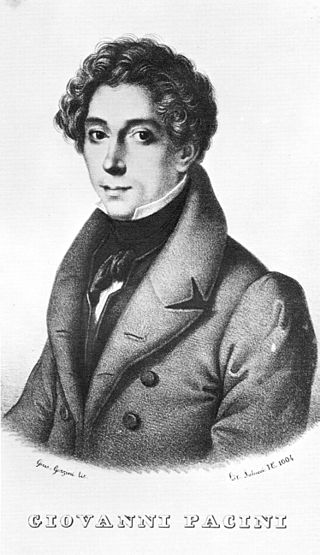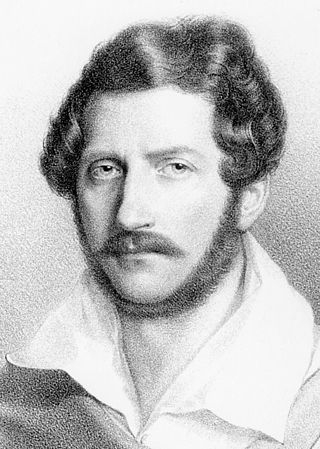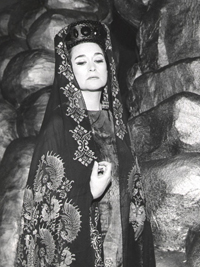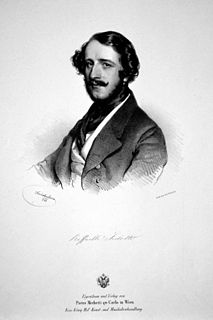
Giovanni Pacini was an Italian composer, best known for his operas. Pacini was born in Catania, Sicily, the son of the buffo Luigi Pacini, who was to appear in the premieres of many of Giovanni's operas. The family was of Tuscan origin, living in Catania when the composer was born.

La vestale is an opera composed by Gaspare Spontini to a French libretto by Étienne de Jouy. It takes the form of a tragédie lyrique in three acts. It was first performed on 15 December 1807 by the Académie Impériale de Musique at the Salle Montansier and is regarded as Spontini's masterpiece. The musical style shows the influence of Gluck and anticipates the works of Berlioz, Wagner, and French Grand opera.

Maria Stuarda is a tragic opera, in two acts, by Gaetano Donizetti, to a libretto by Giuseppe Bardari, based on Andrea Maffei's translation of Friedrich Schiller's 1800 play Maria Stuart.

Ayşe Leyla Gencer was a Turkish operatic soprano.

Alessandro nelle Indie is an opera seria in two acts by Giovanni Pacini to a libretto by Andrea Leone Tottola and Giovanni Schmidt, based on Alessandro nell'Indie by Pietro Metastasio. It was premiered at the Teatro di San Carlo in Naples on 29 September 1824, and had a total of 38 performances in its first season.
Opera Rara is a London-based opera company and recording label which specialises in recording and performing forgotten operatic repertoire from the 19th and early 20th centuries. Founded in 1970 by bel canto enthusiasts Patric Schmid and Don White, Opera Rara's recordings are internationally distributed by Warner Classics. In September 2019, Italian conductor Carlo Rizzi succeeded Sir Mark Elder as Artistic Director.

Nelly Miricioiu is a Romanian-born British operatic soprano singing a large repertoire ranging from bel canto to verismo.

Elisabetta, regina d'Inghilterra is a dramma per musica or opera in two acts by Gioachino Rossini to a libretto by Giovanni Schmidt, from the play Il paggio di Leicester by Carlo Federici, which itself "was derived from a novel The Recess (1785) by Sophia Lee."

Ildebrando D'Arcangelo is an Italian opera singer. He has been called a bass-baritone, though he prefers the term basso cantabile.

Sigismondo is an operatic 'dramma' in two acts by Gioachino Rossini to an Italian libretto by Giuseppe Maria Foppa.
Bruce Ford is an American operatic tenor, particularly associated with Mozart roles and the bel canto repertory.

Saffo is an opera in three acts by Giovanni Pacini set to a libretto by Salvadore Cammarano, which was based on a play by Franz Grillparzer, after the legend of the ancient Greek poet Sappho.

Anna Caterina Antonacci is an Italian soprano known for roles in the bel canto and Baroque repertories. She performed as a mezzo-soprano for several years, particularly performing the Rossini canon.

Domenico Reina was a Swiss bel canto tenor, notable for creating roles in the operas of Vincenzo Bellini, Gaetano Donizetti, Saverio Mercadante, and other Italian composers.
Antonietta Marini-Rainieri was an Italian operatic soprano active during the first half of the 19th century. She was married to lauded operatic bass Ignazio Marini and often appeared on stage with him. In 1835 she portrayed Giulietta opposite Amalia Schütz Oldosi as Romeo in the Teatro Regio di Parma's first staging of Vincenzo Bellini's I Capuleti e i Montecchi. At La Scala she portrayed roles in the world premieres of Giuseppe Verdi's first two operas: Leonora in Oberto (1839) and the Marchesa del Poggio in Un giorno di regno (1840). She also appeared at that house as the Princess of Navarra in the premiere of Gaetano Donizetti's Gianni di Parigi (1839). In 1843 she sang the title role in the premiere of Giovanni Pacini's Maria, regina d'Inghilterra at the Teatro Carolino in Palermo. She reprised that role in December 1843 at La Scala and at the Teatro Carlo Felice in February 1844.

Raffaele Ferlotti was an Italian operatic baritone who had an active international career from the 1830s through the 1860s. He was a regular performer in Italy's leading opera houses, especially La Scala, and created roles in several world premieres. On the international stage he performed in operas in Austria, England, France, and Spain.
Giovanni Schmidt was an Italian librettist.

Scottish opera is a subgenre of Scottish music. This article deals with three separate, but overlapping subjects:

L'ultimo giorno di Pompei is an opera in two acts composed by Giovanni Pacini to an Italian libretto by Andrea Leone Tottola. It premiered to great success at the Teatro San Carlo in Naples on 19 November 1825 followed by productions in the major opera houses of Italy, Austria, France, and Portugal. When Pacini's popularity declined in the mid-19th century, the opera was all but forgotten until 1996 when it received its first performance in modern times at the Festival della Valle d'Itria in Martina Franca. L'ultimo giorno di Pompei influenced either directly or indirectly several other 19th-century works, most notably Karl Bryullov's 1833 painting, The Last Day of Pompeii.














